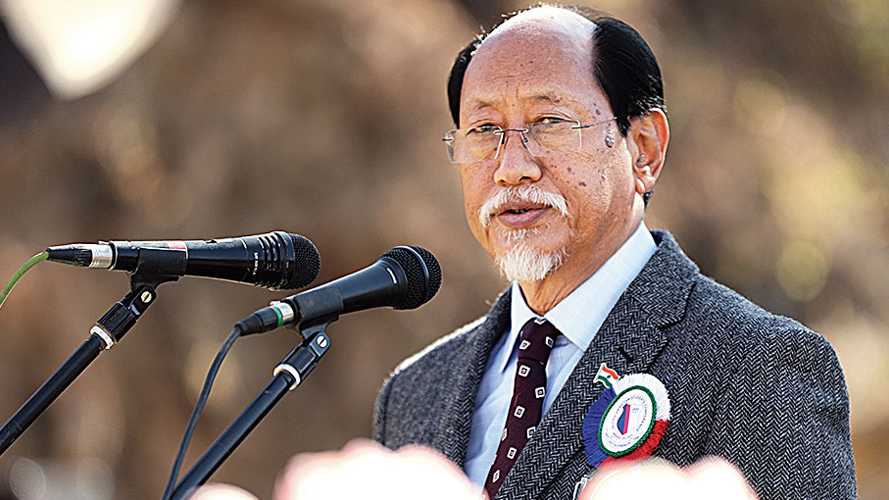The Opposition-less United Democratic Alliance (UDA)-led Nagaland government on Monday held a consultative meeting on AFSPA where most participants wanted the complete removal of the contentious central law.
Naga Hoho president H.K. Zhimomi told The Telegraph that the four-hour long discussion held at Chumukidima near Dimapur was “fruitful” and many participants appreciated the Centre’s move to lift the contentious law from 15 police stations under seven districts of the state from April 1.
“But many participants also expressed resentment for not revoking the law in totality. The House in unison concluded to pursue for the total removal of Armed Forces (Special Powers) Act,” Zhimomi said.
Dr Chotisuh Sazo, sitting NPF MLA and former Assembly Speaker, told The Telegraph that he was “dismayed” over the way the Centre picked and chose the districts while reducing the ambit of the law. “Nagaland is one of the most peaceful states in the country for the past decades. My district (Phek) is one of the relatively peaceful districts for past several years but it is still under AFSPA. It is a step-motherly treatment towards my district. This draconian law should be removed from the whole state of Nagaland,” Sazo said.
UDA chairman T.R. Zeliang said the partial lifting of AFSPA was an “experimental phase” with the end goal being its complete removal from the state.
AFSPA, which gives sweeping powers to the armed forces to search, arrest and shoot in areas declared as disturbed under the Act was also removed from 25 districts and one subdivision of Assam and 15 police stations under six districts of Manipur from April 1. Nagaland chief secretary J. Alam said AFSPA had been removed completely from three districts and partially from four districts, expressing hope that further progress would be seen in the days to come. Assam has 35 districts while Manipur and Nagaland have 16 districts each.
There were sustained protests in Nagaland following the botched counter-insurgency operation in which 14 civilians were killed in Oting under Mon district. The Nagaland Assembly had adopted a resolution seeking the repeal of AFSPA. The partial repeal of the law on April 1 is being attributed to the Oting killings and its aftermath.
According to a government media statement issued on Monday evening, Nagaland chief minister Neiphiu Rio said “total abolition” of AFSPA might take time but its partial abolishment was a test because the law might be reimposed if law and order could not be controlled during this crucial phase.
“He appealed for co-operation with the government to ensure that no untoward incidents occur. He appealed to all the stakeholders to seriously ponder how to maintain law and order in the state. As the Naga solution is for all the Nagas, he appealed that the Nagas should harbour a sense of unity and oneness and not be selfish in their demands. He thanked the CSOs, tribal leaders, and student bodies for always cooperating and supporting the government,” the media statement said.
Rio had hailed the March 31 decision of the Centre to reduce disturbed areas under AFSPA in Nagaland, Assam and Manipur from April 1 as it would help bringing stability, security and prosperity in the Northeast.
Nagaland home commissioner Abhijit Sinha said it would be the joint responsibility of all stakeholders, including community and tribal leaders and student bodies, to keep peace because AFSPA might be reinstated if there were law and order issues. He said the law had been withdrawn from only 15 of the 72 police stations in the state. The law is still enforced in nine districts — Mon, Kiphire, Noklak, Phek, Peren , Zunheboto, Dimapur, Niuland and Chumoukedima.
Monday’s consultative meeting was held at the Nagaland Police Complex, Chümoukedima, where the state cabinet led by Rio and deputy chief minister Y. Patton; chief secretary and director-general of police and other senior government officials were present along with civil society and tribal hogo leaders.
The government had invited, among others, Central Nagaland Tribes Council, Eastern Nagaland Peoples’ Organization, Tenyimi Peoples’ Organization, Angami Public Organization, Ao Senden, Mokokchung, Chakhesang Public Organization, Chang Khulei Setsang, Konyak Union, Khiamniungan Tribal Council, Lotha Hoho, Phom People Council, Pochury Hoho, Rengma Hoho, Sumi Hoho, Tikhir Tribal Council, United Sangtam Likhum Pumji, Yimkhiung Tribal Council, and Nagaland Zeliang People Organization. The Konyak Union, however, stayed away from the meeting.
AFSPA has been in force in Nagaland since 1958, Manipur since 1980 and Assam since 1990.
Naga Students’ Federation (NSF) president Kegwayhun Tep said he was dismayed to see senior Naga leaders accept the piecemeal arrangement by the Centre. He said no resolution was adopted at the meeting but everybody shared their views.
Making a strong case for the law’s repeal from Naga-inhabited areas, Tep told the media after the meeting: “Naga people are living in a peaceful manner and Nagaland and Naga homeland does not merit AFSPA. As long as the law is not revoked, the NSF has urged the Naga people not to cooperate with the armed forces or accept any humanitarian aid from them. We will continue to fight till AFSPA is lifted.”
The common refrain in Nagaland is that the overall situation has looked up since the Centre and NSCN (IM) entered into the ceasefire agreement in 1997 and there is no justification in retaining AFSPA when efforts to resolve the Naga political issue are at a very advanced stage.










